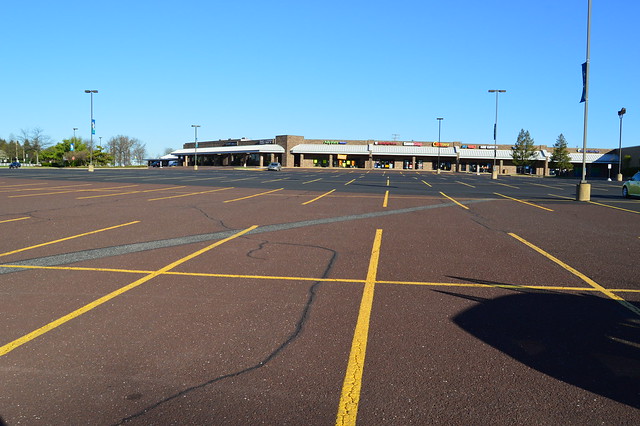
Everyone knows Multnomah County is growing, and that most new residents are buying or bringing in cars, too. In all, state records show, 8,709 more passenger vehicles are registered in the county than there were in 2007.
But a review of car registration statistics shows that if passenger vehicle ownership were still as popular in the county as it was in 2007, it would have had to find room for 38,501 more cars and trucks instead.
How many cars are we doing without? Well, if we built a parking lot to hold the 38,501 cars that didn’t show up and assumed a standard 325 square feet per space, we’d need about 287 acres of land. For the sake of scale, that’s everything between NE Killingsworth, Skidmore, Rodney and 16th:
Or, if you prefer, it’s the entire Foster-Powell neighborhood west of SE 73rd Avenue:
Or it’s Portland’s central business district:
Or about half of Oxbow Regional Park:
(Of course, that’d only be enough room to park each car once. In a U.S. city, there are something like 3.3 parking spaces for each car.)
But because of the 7 percent drop in per-person car ownership in Multnomah County over the last eight years, those 38,501 cars haven’t arrived.
Advertisement
That’s despite a regional economy that continues to rocket out of the recession, especially in Multnomah County. Despite a U.S. economy that’s been sending off mixed signals, the Portland-area jobs market keeps doing well. It’s ranked 15th of the 50 largest metro areas for job creation since 2008; in the year to April 2016, local jobs grew 3.2 percent, about twice the average rate for metro areas.
But for whatever reason, all the additional money pouring into Portland hasn’t been spent on more cars. Car registration rates have ticked up a bit since the recession, but only slightly.
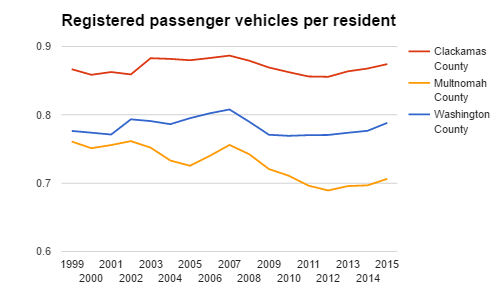
That’s not the case nationwide or in Washington and Clackamas counties. Unlike in Multnomah County, car registration rates there have basically returned to their long-term average rate.
When we last looked at car registration rates, I asked Todd Litman of the Victoria Transport Policy Institute why this ebb in car ownership might be happening.
He said it’s a combination of the Baby Boomers entering retirement and the improvement of non-car transportation options.
“Somebody who 10 years ago would have driven to work is now not only seeing better bicycle facilities and hearing about the importance of healthy lifestyles and getting lectures from their physician about the benefits, but they’re also seeing their neighbors make that shift and it’s a little more socially acceptable,” he said. “When the car breaks down, they’re not going to replace it.”
You can explore the parking lots that weren’t needed on this Google Map we made.
— Michael Andersen, (503) 333-7824 – michael@bikeportland.org
Our work is supported by subscribers. Please become one today.



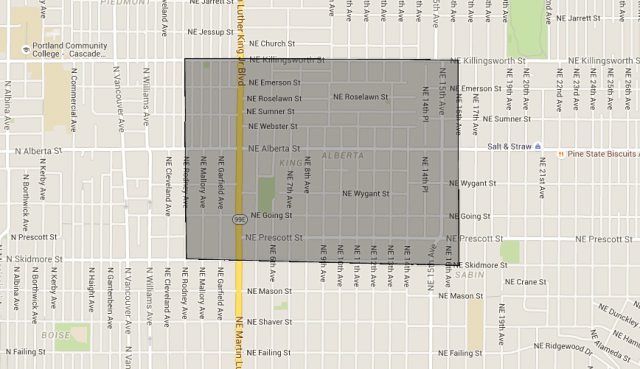
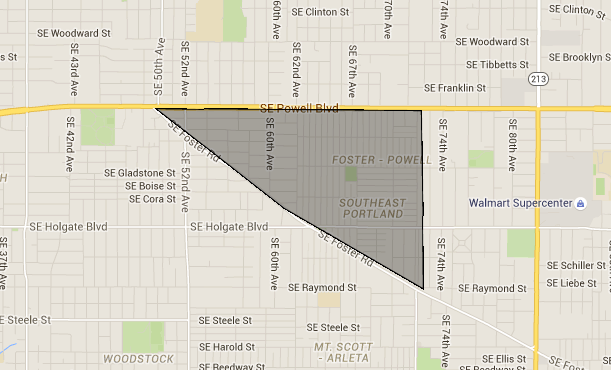
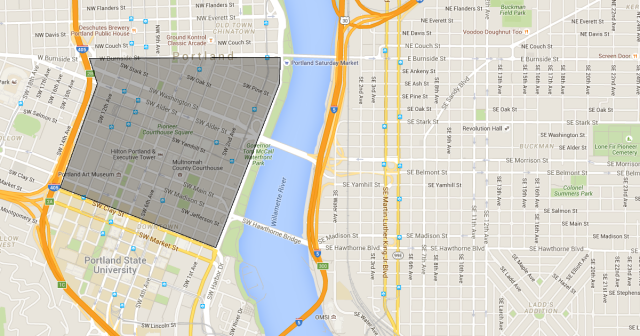
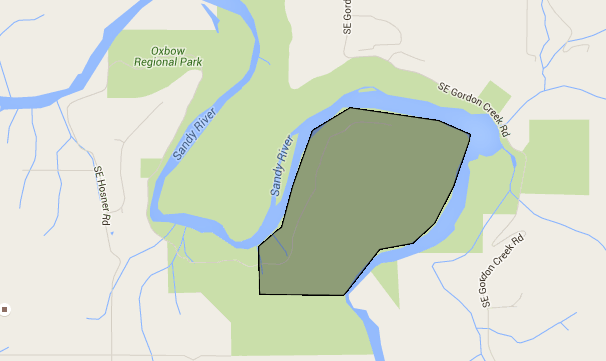

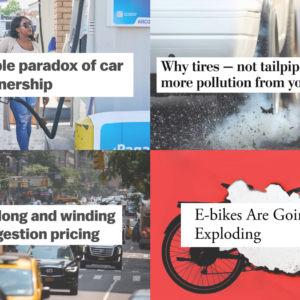
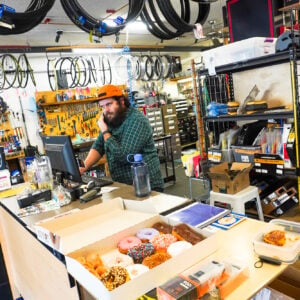
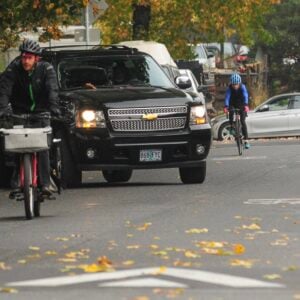
Thanks for reading.
BikePortland has served this community with independent community journalism since 2005. We rely on subscriptions from readers like you to survive. Your financial support is vital in keeping this valuable resource alive and well.
Please subscribe today to strengthen and expand our work.
In addition the factors mentioned in the article is the overiding one that in urban Multnomah County Automobiles are becoming a less effective transportation tool. Parking availibility, congestion, and the increasing access to cycling routes, and mass transportation often work much better ( and are certainly cheaper) than trying to go from A to B in a Car when parking is considered. This is not necessarily the case in most of Washington or Clackamus Counties. It does highlight the progress that can be made when densities go up, transportation alternatives are improved and people are educated and gain practice in automobile alternatives. That is why sites like Bike Portland are as important as anything else we can do as a civilization to eliminate the “Demon Karz” before they eliminate us.
Great work Michael. I think this dovetails nicely with Roger Geller’s exploration of Census data, showing that people moving to Portland are bicycling and using other non-auto modes at greater levels than the city and region as a whole.
Our economy is doing well, in part because we are attracting talented people who like the idea of not having to own a car…or two cars…in order to have a high-quality life. But, that only applies to certain parts of the city. We have to give everyone that chance, regardless of where in the city or region they live.
What about abandoned cars in Multnomah County?
I think there’s on average 2-3 abandoned cars per block.
More if you count dead cars in driveways that then force the functioning vehicles to park out on the street.
It is truly amazing to think that at 3.5 parking spaces per car in an average city our petroleum powered servants are allocated more “living” space each than the average millennial can afford to occupy in Portland. To be a cycling advocate is to be a voice of sanity in an insane world.
This is over a ten year spread including the recovery from the “great recession.” I wonder what it will be in another decade? The graph shows the numbers ticking back up (as mentioned in the article).
I think most people will be surprised at what will happen with the ownership and use of cars over the next ten years. The ongoing financial destruction of the petroleum industry caused by oil prices well below the cost of production for new wells of any kind will have serious ramifications in the near future. The common story is that these low prices are caused by fracking but they are really caused by a worldwide reduction in demand due to poor economic conditions in countries such as Greece and Brazil. New wells are not keeping pace with the relentless decline in production from existing wells which will lead to a severe increase in prices or a drastic reduction in supply. Portland will be in a better position to handle this than most metro areas, but you ain’t seen nothing yet when it comes to a reduction in car ownership.
Many kids today don’t even want to get their drivers licenses. I credit at least some of the drop in auto ownership to the increasing availability of ways teens can “get out of the house” without actually going anywhere, via phones and other technology, the use of which, and ability to enthrall, will only increase over time. The looming entrance of robot cars will also change things dramatically. In 20 years, I think the transportation landscape will be completely different.
Actually, today’s low oil prices are being caused by a deliberate oversupply of oil from Saudi Arabia designed to drive prices down and cause grief for the multinational oil companies.
Sorry Buzz, this is a commonly held assumption that is promoted by most of the media, but a quick glance at a chart of Saudi Oil Production and especially Saudi Exports ( Production minus internal consumption) will show that Saudi Exports have not really grown at all and are in fact lower than they were in 1981. The Saudi’s produce at most 10 MBD as compared to the Worlds use of 90MBD. IF this was on purpose by the Saudi’s ,it is certainly a risky gamble as it has caused them to draw down there soverign wealth fund at an alarming rate and even caused them to talk about putting the state owned oil firm ARAMCO up for sale to raise cash.
It’s both, actually. If you look at production and demand charts, you see that demand has softened in developing countries, and producers with lower extraction costs have chosen to maintain production, potentially driving out higher-cost competitors.
Yes. Power gen is much more efficient and less diesel-powered, diesel transport (trucks, trains, boats) is far more efficient, and demand has continued to grow but at a flatter curve than in the past. On the supply side it’s not really the Saudi’s but OPEC as a whole that’s launched into economic warfare with the US, who is just as much to blame for not trailing production off. Incidentally, the middle east, especially UAE and Qatar, are growing quite rapidly right now. The oil & gas industry as a whole is a big customer of my company, and despite many job losses (especially in US with the small upstarts racing after the Bakken Boom) they are still investing heavily in infrastructure.
Deleted a thread that was semi-civil but just got too far into the weeds of politics and culture on the Arabian peninsula.
Great article! This really underscores the need for Portland to vastly improve its public transportation system. We need better coverage,longer operating hours, increased frequency and higher priority for buses, streetcars and trains. I also support expanding the train network starting with Powell/Division (elevated line from Ross Island to 39th) and creating an orbital MAX loop based on the 75 bus line.This would dovetail nicely with increased/expanded fees for parking, developing the bike network, and expanding the inclusivness of the bike share to allow people under age of 18 to participate.
Given this data, why then is PBOT so concerned about retaining on-street parking? Think of all the cycleways we could build instead of parking!
Agree. Maintaining parking, having parking minimums in zoning, and having generous maximum ratios aren’t sending Portland in the right direction.
As an example, max ratios in Pearl are 1.5 or 1.8 (sorry, can’t remember exactly). Why not 1.0 or lower? That area is well-served by transit.
Hopefully the 2035 plan will help.
PBOT likely sees a lot of pushback from businesses. Instead of caving to business needs, PBOT should launch a campaign to convince business owners that they don’t need on-street car parking. Nearly every other city that pushed back against businesses and installed people-friendly infra saw those same businesses change their mind after the project was complete. We’ve even seen this in Portland at Ankeny Alley! Why the timidness, then?
There are a lot of areas of Portland that I do not go to due to lack of parking. SE Hawthorne & NW 23rd to mention two. Of course those areas have enough of a built in customer base that live within walking distance. I am sure my business is not missed.
I hardly ever go downtown anymore. Twice a year to my dentist, who validates my parking at a parking structure across the street is about it. Since MAX yellow line service is not dependable, putting it mildly, & would cost me $5 roundtrip, I now avoid it like the plague. My dentist does not hand out Tri-Met tickets.
If I need to do any shopping outside of Fred Meyer or Costco, I generally go to Lloyd Center. Lots of free parking there.
Of course, I did go on a 22 mile roundtrip bike ride to Vancouver this morning. That was fun. Left some $ at the downtown Vancouver Starbucks.
Ah, retirement. What a life.
There is a high cost for free parking.
Parking has gotten easier in Northwest, which has meters all over now.
“There are a lot of areas of Portland that I do not go to due to lack of parking.”
Do you mean car parking?
I have never had any trouble parking my bike at those locations.
We blame the businesses because, well, they have more clout. That said, poll any one residential street and tell me what percentage of residents support removing ALL parking.
Plenty of people are up in arms over parking, but the overwhelming message is “I couldn’t park where I wanted to”.
If I were the king of portland, there would be zero, zilch, nada on-street parking. I’m also well aware that I’d be overthrown the very next day. Nearly everyone is under the delusion that they own the space in front of their home or business. Pretending this is strictly a business lobby issue is incorrect.
Whether businesses need parking depends on the area. Ankeny downtown, or the Pearl District, or NW 23rd, are a lot different than other, less dense areas. It seems to me, as a general impression, that shopping/commercial areas benefit from on-street parking to get established. Later on, as density in the neighborhood increases and a customer base grows that isn’t coming via autos, the on-street parking gets less important, and can even become a liability because it gets in the way of things like wider sidewalks, bike lanes, etc. that take the district to the next level.
But I don’t know if you can start with those things, without first going through the on-street parking stage.
That assumes people will bike more. Some people simply will never bike and they still need to be accommodated…whereas people who want to bike and are committed to it still will, even if the infrastructure is not ideal.
At least half of those people who don’t bike today likely would if there was a network of safe cycling infra to do so. That means separated cycleways (i.e. protected bike lanes). Get all those people out of their cars and suddenly it’s easier to justify bus lanes that connect to less easily bikeable areas of town. Sure, some people will never bike, but if you make driving terrible while making public transport amazing, they’ll probably take the bus. It’s good to have options too, as “people who cycle” are not a discrete group and might want to take the bus occasionally too.
“Making driving terrible” is a great way to build a consensus that our system of transportation needs to include more cycling and transit facilities. “You won’t believe how terrible we’re going to make it!”
If the only way you can make cycling and transit look better is by making the alternatives worse, you’ve already lost. Isn’t it enough to “make transit amazing?”
No. People will still do whatever is most convenient to them. If we have to shoehorn any transit or cycling improvement around maintaining easy driving, then we’ve already failed. Look at any city around the world that has great public transport and cycling: it’s a nightmare to drive there. That’s on purpose. If we want to reduce driving, we need to use both sticks and carrots.
You are proposing making driving worse as a specific (and primary) goal of your vision, not as an unfortunate side-effect of allocating more space to transit/cycling. I don’t see many buying into it.
If “too much driving” is the problem then reducing driving should be the goal. Taking away half their currently allotted road space to build bus lanes and cycleways would be a good start. Yes, making driving more difficult would be a side effect of this re-allocation, but the difference is that I see this as a feature, not a bug.
Where you frame the goal as a negative (less driving), I see it as a positive (more options). I think it is safe to say your vision will never achieve critical mass; mine might.
When you frame the solution as “more options”, agencies propose widening roads to accommodate bus lanes. When you frame the solution as making transportation more efficient and fair, this requires removal of space for cars, since they take up the greatest amount of space per person.
Cars and the infrastructure to support their use inherently push out all other modes. They slow down buses and make cycling and walking less safe. How do you propose improving non-car travel without making driving worse? There is no solution I can think of for improving public transport and cycling that doesn’t involve reducing SOV driving, unless we’re willing to massively widen ROWs (terrible idea) or invest in a underground metro (massively expensive).
Take diverters. Their primary goal is to make cycling more comfortable and they do this by making driving more difficult by design. Literally all they do is force inconvenience upon drivers. Increasing parking fees also increases the burden of driving. Speed bumps, too. When MAX was built on Interstate, space was taken away from cars. All I’m proposing is to take these to the next level: way more diverters, more expensive parking, more dedicated transit lanes, more cycleways. Given a fixed amount of road space, I don’t see any other way to accomplish this other than taking space away from cars.
I (mostly) like the diverters on Clinton. But I wouldn’t try to sell them by focusing on how much harder it will make driving through the neighborhood. With your framing of the issue, diverters are an absolute good in themselves, and should be placed everywhere, regardless of whether they help cycling or not. With my framing, they’d only go where they’d really help, and we’d look for ways to make them less disruptive.
There are all kinds of ways to improve non-car transportation without any significant impact on car travel, or taking space from cars. A few examples: more bike racks, more facilities for bike commuters in buildings, more frequent bus service, more and better bike/pedestrian paths, better sidewalks, bus stops with shelters, better lighting for pedestrians….
I’m with Adam H.
Making driving more costly is exactly what all the countries we look to for inspiration (on transportation) have done (for generations). Why do we try so hards to get around this simple relationship in this country?
“I don’t see many buying into it.”
Maybe that is the problem. Maybe framing this as a consumer desire thing is counterproductive; maybe instead talk about the social good, constraints,,, you know, the kinds of things our lives are made of, not the State-of-the-Union boosterist fluff.
This is oversimplifying things, but if there was a vote in Portland to spend money to “make driving more difficult”, with lots of explanation why that’s beneficial, I bet you’d get a “yes” vote of about 5%.
Isn’t that how the diverters are sold though? Their goal is to reduce cut-through motor traffic and that’s exactly how PBOT sells them to neighbors. Easier cycling is a nice side effect of calmer streets.
Adam H. was arguing for making driving more difficult, not more expensive. I am in favor of a small but steadily increasing carbon tax that would certainly include gasoline.
I thought the diverters were presented as a way of improving cycling conditions by reducing through traffic, which is different than seeking them as traffic snarlers that happen to improve cycling. I think in this case it’s a difference in emphasis.
I’m arguing for both. Making driving more expensive is a part of making it more difficult. We need cities that work for people, not for cars, and the two cannot coexist. Instead, we should design a city where driving is possible but as a last resort because all other modes are far easier and more convenient.
Plus, I’m not totally sold on a carbon tax alone working long-term. Yes I think it’s a good idea, but this will prompt manufacturers to move to electric vehicles. This is definitely a good thing, but EVs still don’t solve the issue of roadway space, safety for vulnerable road users, or urban design for people rather than for cars. A bus lane or protected cycleway, on the other hand, will work regardless of the car’s fuel source.
Just as an incidental point, I read recently that electric cars and newer gasoline cars emit about the same amount of particulate pollution while they are being driven, and that’s not including pollution from producing the electricity. Who knew?
I’d really like to read that electric car co2 study, H K. Let me know if you find a reference or a source.
q-wrote: “a vote in Portland to spend money to ‘make driving more difficult’, with lots of explanation why that’s beneficial”
But that is asinine or tautological or both. The whole point of running something against the grain like that by voters (and that isn’t necessarily a smart thing even with lots of explanation) would be to offer a full explanation about, e.g., why we are stuck with doing this, how we’ve screwed ourselves out of the options that might have allowed us to continue with business as usual, etc.
This is just the first link I found that discussed the emissions of electric cars. This has nothing to do with CO2, but rather particulates emitted as the vehicle is used (which are a critical component of urban air quality).
http://www.digitaltrends.com/cars/electric-car-particulate-matter/
We’ve been making driving as easy as possible for nearly a century and all it’s done is destroy our cities, our climate, and our finances. Time for another approach, I think.
Do you have a source for this or is this just your personal speculation? I don’t quite buy this, particularly in the rainy Pacific Northwest.
http://web.pdx.edu/~jdill/Dill_VeloCity_Types_of_Cyclists.pdf
The reduction in vehicle miles per resident is even more impressive:
http://www.oregonmetro.gov/news/you-are-here-snapshot-how-portland-region-gets-around
(And, unlike auto ownership, is not increasing over the past 4 years.)
I wonder if the reduction in car registrations per person are concentrated among the new residents or if longer-term Portlanders are abandoning their cars, as Todd Litman seems to think.
I suspect there are a lot of people who believe the propaganda story that PDX is a great place to ride a bike and be car-free, so they move to Portland in hopes of living that dream. Hopefully, this can become self-fulfilling and a positive feedback loop.
I’ll bet reduction is concentrated in younger residents, new or old, and that most newer residents tend to be younger.
I don’t know. I think a lot of boomers are moving to Portland.
Adding in Clark Co, WA would be a nice addition to these charts if data is available
I wish Clark County were always included in Portland’s statistics about traffic, land use, etc. Portland often seems to live in a statistical fantasyland, because Vancouver just doesn’t count in so many statistics. Much of Clark County is just Portland’s sprawl, but being across the river in another state, it’s made invisible in statistics.
Weren’t people registering their vehicles in Vancouver for various reasons? Is that still happening? And if it no longer happens, wouldn’t it lead to an increase in Multnomah registrations?
Some in Washington County have registered their cars in Montana and Idaho.
I think there are probably even more people who still own a car but use it a lot less than they would have a decade ago.
Just a plug. If you are interested in parking reforms and aren’t on the Portlanders for Parking Reform (transitioning names from Portland Shoupistas) then you should be!
http://pdxshoupistas.com/ @pdxshoupistas
Awesome news for urban design.
But also bear in mind a lot of the decline in car ownership is probably also due to declining real incomes. Much of the money people were spending on cars is just not there. They never earned it. 🙁
Yep. Wages remain constant while housing prices increase and suddenly that $500/month you’re spending on a car becomes too much to afford. Also, you can afford to live closer-in if you ditch that monthly car payment and insurance premium.
Wow. $500 seems ludicrous, so I looked it up. “According to Edmunds.com, the average monthly payment on a new vehicle is $479.” If you can delay buying a car for just one year, you can use your savings to buy a cheap used car, skip the payment, and use the extra money for a better apartment (or, better, spend half on beer, and bank the rest).
Yep, and that’s only the car payment. That $479 doesn’t include fuel, maintenance, insurance, registration fees, parking costs, or depreciation. Compare that to how much you’d spend on public transport ($100/month) or cycling (pennies) and the cost of car ownership starts to look impractical. As traffic congestion whittles away at the convenience a car brings while costs continue to rise, it is imperative that we continue to push in this direction rather than trying to “fix” the situation by “improving bottlenecks”.
$500 is actually low. Once you factor in insurance, gas, tires, maintenance and repairs the average American spends more like $800 per month.
Don’t forget about depreciation! That car will be practically worthless when it comes times to sell it. Bikes hold their value far better. Also you collectively own all the public transport vehicles, so no need to buy and sell anything!
I actually paid cash for my current two vehicles. And, since I “collectively own all the public transport vehicles,” if I didn’t have to pay Tri-Met fares I would consider taking public transport again.
Also, it is hard to shop at Costco by bike & really hard to transport my ski equipment to Mt Hood by bike. Bikes don’t work for everything.
Car share works great for that while still doing away with all the pitfalls of car ownership and overuse. If you are literally paying for every trip, then you’ll only use it when all other options are exhausted. It’s the car trips that can easily be replaced with cycling or public transport that we need to be doing away with. IMO, the best way to do this is high parking fees and draconian towing policies for illegal parking.
Interesting reasoning Mark. Even if you pay cash, your vehicle still has a monthly capital cost which equals total cost divided by total months of serviceable life. Then one has to add in insurance, gas, repairs and maintenance. I am sure this total is higher than the cost of cycling or trimet. In terms of getting to Costco or Mt. Hood. Ivan Illich described the automobile as a radical monopoly because it eliminates other ways of doing things. One can’t really fault a bicycle or bus for not being good at getting to Big Box Warehouse stores in the suburbs or daily trips to the mountains because both those things were creations of post war boom in “happy motoring” Without the auto, people would get cases of Cheeze Doodles or disposable lawn furniture another way and trips to the mountain would happen another way, perhaps small alpine railroads like in Switzerland.
Also, driving your car to go skiing on Mt. Hood is something of a self defeating activity as the c02 induced climate change caused by you and others driving to the slopes will soon shorten the ski season so drastically that all the resorts will go out of business.
Actually the main reason for climate change is the overpopulation of planet Earth. If there were less people on the planet, there would be less people breathing, less demand for manufactured products, including automobiles, less demand for deforestation to provide wood products for all kinds of things, less demand for building houses & roads, less demand for new office buildings & apartments, on & on adnauseum.
If anyone believes that climate change can be reversed without solving the overpopulation problem is sorely lacking in common sense.
That’s not entirely true. Someone has to go so they can share knowledge/experience/photos so that people who never go feel a connection with nature and advocate for sensible policies. Otherwise, no one would know what is lost when these areas are wrecked.
What is true is that not many people can do this before it causes real damage. But very few people get to the truly beautiful stuff. I’ll be camping on Hood this weekend and if past experience is a guide, my buddy and I won’t see anyone else, maybe 2 people tops.
Youtube.
It’s actually not that hard to shop at costco by bike, I use a flatbed trailer with a big plastic tub strapped to it. There is a bike rack about twenty feet from the front door.
I shop at Costco regularly, but I have never used a car to do so. It’s quite simple to load up a bike trailer. In fact, I haul more than 90% of the motorists I see there.
As far as skiing goes, when I engaged in that activity, I usually took the bus; that was back when I lived near the Sierra where ski buses were common.
I’m always disappointed when people make false claims about how essential cars are for various activities. Sure, I use a car occasionally, but it’s awfully rare and even when I use it I’m honest enough to acknowledge that it’s mostly due to laziness or poor planning, not because the car is necessary.
Then you’ve never cared for a disabled parent. Can’t load them on a bike trailer.
So how far do you live from Costco? I bet a lot closer than I do. I live 2 blocks west of Interstate Ave. The Costco where I shop is on NE 138th Ave. No way is my wife going to agree to shop at Costco by bike.
I am glad you can shop at Costco by bike. It is not a viable option for me.
Maybe find a store that is closer?
I have never been to Costco, so don’t know what the attraction is, but if you subtract the cost of the automobile-you-may-no-longer-need-because-you-shop-closer-to-home, perhaps a closer-to-you store’s prices would pencil out. Or perhaps you could have the food brought to you…. I host a dropsite for Azurestandard.com, where a couple dozen others and I get a once-a-month delivery of bulk food, most of it organic at very good prices.
I’ve mentioned this before, Oregon has branded itself as an outdoors state. I own a car not to drive around in the city but to leave it. We’re currently driving to Utah, it’d be hard to do that with a Car2Go or bike. Sure, we could ride our tandem, but it would take 20 days. Maybe if the Feds closed off all the wilderness I’d get rid of my car or if a vanpool went to every location I ever went to, then yes maybe… The Portland outdoor elite are in trouble if they can’t park their Subaru in front of their apartment complex… I own an old Camry.
depends when you sell it and what condition it is in, as well as the car model. I’ve had great success with car sales when it comes to selling used vehicles. After having owned over 20 bikes and having raced for the better part of a decade (upgrading bikes every 2 years), bikes actually hold very little of their original value after a few years. Bike depreciate as well.
My girlfriend pays 500 a month, but all maintenance and tires are included during the life the lease. Super expensive, but no where close to 800$ month. And gas = replacement for an 80$ Trimet pass. Don’t get me wrong, I want to get rid of it and become a one car household. My car is paid off and super cheap to operate.
What about insurance?
And what if one has a commute? I think people on this site tend to assume everyone lives near their workplace.
Well, then go ahead and buy a car! No one is stopping you. But people have choices about their location, and in the aggregate it appears that more and more people are choosing to locate in places where they don’t have to be so reliant on a car. Also, it’s possible to commute quite far by bike or transit.
What do you mean by “commute”and “near”? Some of us have had 100 mile round-trip commutes that we have joyfully accomplished by bike. Other people seem daunted by any distance over three miles and can’t imagine not using a car for that. (I think that’s not far from the median trip length for motorists.)
I’ve rarely lived near my workplace, if near means less than five miles. I’ve also rarely chosen to drive to work. I don’t assume that people need to live close to work in order to choose to not drive there. I don’t think the folks on this site assume everyone lives close to their place of employment. We do assume that people are creative enough to often find ways to get around that don’t involve single-occupancy cars if they want to.
Agreed, but not everything has to be about bikes. Public transport works great for longer commutes and can also massively benefit from improvements such as bus lanes and signal pre-emption. We should also be densifying neighborhoods so that people don’t have to live 50 miles from work, unless they’re doing so by choice, in which case they absolutely should pay for their destructive habits.
Obviously people’s personal experience varies hugely (too much), but in general, Portland has actually had rising real wages since 2007. (The recession began in December 2007, so that’s compared to pre-recession figures.) The average weekly wage in the Portland metro as of late 2015 is $1,028, up 19 percent since 2007. Inflation for that period for the Portland metro area is 17 percent.
That’s not as much growth as any of us would like, I’m sure, but again it’s better than most U.S. cities.
People who spend disproportionate amounts of their income on housing (which probably includes most Portland bike users) are going to be disproportionately hurt by the housing price spike, so their personal inflation rates may be higher than average. Which is exactly why BikePortland covers the housing crisis!
I wish you’d cover more about the horrid state of our air pollution (industrial, diesel, wood smoke) — that also affects cyclists more than (most) others, and probably more directly than the cost of housing does.
How many readers know, for example, that when they negotiate the curve at the foot of the Burnside Bridge, they are breathing some of the dirtiest air in America?
it would help if you stopped calling it all a “crisis”. Its a market correction based on supply and demand.
I’m not sure how “crisis” and “market correction based on supply and demand” are mutually exclusive.
10 years ago Car2Go and Zipcar weren’t around. Having these 2 options helped me not want to purchase a car.
That’s definitely a factor for some people.
Without zipcar in the area, I suspect I would have bought a car as soon as I moved here.
I still probably will eventually. I went car-free for years on the east coast, but you don’t spend your life in the “good road state” without developing some attachment to driving.
My wife has never driven in Portland and swears she never will. Compared to what we’re used to, it’s a nightmare that she doesn’t want to deal with. While I’m willing to brave it for the occasional trip, I continue to wonder why anyone who wants to drive everywhere would ever live here. People in every city complain about traffic and road conditions, but PDX really is a bad place to drive. I suspect a lot of people don’t realize that until they’re already here. A number of advocacy groups would do well to start promoting that fact as a way of keeping certain people away.
I have no idea where you’re from, but compared to larger cities I’ve been in this country of ours, Portland roads are pretty damn friendly and uncrowded. Try driving in SF or NYC sometime. Hell, even Seattle most days.
NYC is very stressful when driving with many angry drivers. Build those bike lanes and trails!
Same here! Every time I get tempted to buy a car to have more “freedom”, I just do the math. Buying and owning a car would be at least $500 a month, whereas I currently spend roughly $150 to $200 a month on Zipcar/Getaround/Car2go. So I could just budget more money to carshare if I want more freedom for road trips and whatnot, and I would still save money over buying a car. Plus I get to drive pretty nice new(ish) cars, and don’t have to worry about maintenance, insurance, and (in most cases) buying gas. It’s just a way better deal. I think the only reason I would buy a car is if I decided get a large dog or have a child, and even then I would consider a cargo bike instead.
Didn’t trimet raise fares to cover fuel cost spikes back a few years ago, then never lowered them? I’d leave my car at home (maybe even get rid of it) a lot more if I could get downtown, do business, and get back home on one fare .
It’s possible that Michael is interpreting the data correctly, but I always suggest making sure to challenge your own preconceived notions of the data. The story quotes just one person for a comment who works at an organization that promotes alternative transportation, so I’m not surprised this is “explained” by preference for alternative transportation. Would the Cascade Policy Institute interpret the data the same way? Do the readership here care?
The time points chosen above are a bit problematic if you are correlating job growth with automobile usage. Perhaps it was not intentional that time comparison starts at 2008, the highest point in job LOSS (lowest point in job gains) in the past decade, but that’s what it appears to be (see here /7f88db09-c21c-4e85-b894-0e3191d03365?t=1439909286338).
/7f88db09-c21c-4e85-b894-0e3191d03365?t=1439909286338).
MC job growth was anemic from 2005-2007, showed a huge loss in 2008, zero in 2008, and didn’t begin its uptick in 2010. It is true that since 2008 we are doing better than many urban areas since 2008, but it’s also true that we performed very poorly relative to those areas for the previous decade.
The car usage graphic seems to follow an awfully similar pattern with a 1-2 year lag, just what you might expect for a large consumer purchase.
Just pointing out, there are different ways to slice up these data.
Good idea to call Cascade Policy — I spent some time thinking about who would give a good analysis quote, and decided to just pull Litman again since I was pressed for time. But I’d be interested to see what they would say, too. (In my experience, their free-market philosophy seems to suddenly become less important than “economic stimulus” when I ask about parking policy, but you never know.)
It was definitely intentional to start from the worst point in the recession, since the point here was to show that though the recession clearly caused the 2007-2011 drop in car ownership, we’ve had a stronger recovery than most cities for five years now but that hasn’t led to a rebound in car ownership.
Michael, a drop in “car registration” does not necessarily equal or indicate a drop in “car ownership”. It could also indicate a drop in car owners willing to register their cars. Multnomah County, much like most urban counties in the US, likely has a higher rate of non-compliance of car owners having either properly registered vehicles and of not having insurance. So the drop in rates may simply mean that it is easier for car owners to evade the law in Multnomah County than in other parts of Oregon.
To check the figures, I suggest checking changes in average daily traffic flow along I-205 or on the Multnomah I-5 bridge, which you can get from ODOT, or else a busy section of outer Division on Portland Maps. A drop in vehicle numbers should equal a similar drop in traffic. Another yardstick is measuring gas tax collected by Multnomah County. As far as I have seen, there has been no drop in the gas consumed in the County, quite the reverse.
Census surveys have shown the car ownership rate decline as well.
>That’s despite a regional economy that continues to rocket out of the recession, especially in Multnomah County.
If the point is that people can easily afford a car and are choosing not to, I’m not sure that’s the case.
Share of households paying at least 50% of income in rent (ACS table B25070) is higher in Multnomah than the other counties, and higher in all of them in 2014 than 2007. Median household incomes are a good chunk lower in Multnomah than the others in 2014. And lower in Multnomah adjusted for inflation in 2014 than 2007. Maybe also look at share of low income households paying more than 30% in rent (C25074).
Not sure where to get data on the number of paid parking spots for residential units, but I’m guessing it’s increased more in Multnomah, effectively increasing the price of car ownership. Add in that Multnomah has a higher share of people living in 1 person households (B08201) where it’s harder to split the cost of a car with other people/maximize use of it and the effective per person price increases too.
If there is significant enough housing expansion that rents are kept in check for a few years while the economy continues to expand, will the car ownership rate start edging back to where it was 10 years ago?
lop–I always appreciate your info and insights.
I could see the County’s car ownership rate edging up slightly again–or not– but for all the reasons you noted (income, cost of ownership, percentage of single-person households…) I’d guess it will stay lower–and get increasingly so–than for adjacent counties.
That’s because I see a “reinforcement spiral”–more people will choose to live in Portland/Multnomah County because they can manage without cars more easily than in adjacent counties. At the same time, people who want or need cars will choose to live in the adjacent counties. As that happens, non-car transportation options in Portland will improve, meaning it will become even easier to go without cars here, and probably increasingly expensive to have one compared to other areas. So even more non-car people will move in, and more car people will move to the other counties.
Over time, Portland/Mult. County will be the place where cars are increasingly less desired/less needed/more expensive, and the adjacent counties will be the opposite, even if they are also making progress on reducing car reliance.
>and the adjacent counties will be the opposite
i don’t think you made a strong case for this. portland’s suburbs have higher bike mode share than most suburbs 1-1.5%. and some large census tracts in beaverton, tigard, adn gresham have ~3-4% mode share.
It was a general idea. I’m sure there are parts of Multnomah County that are far more car-reliant than parts of adjacent counties, and vice-versa, but that doesn’t negate the general idea.
Plus, if Portland’s suburbs have higher bike-mode shares than most suburbs, and those Portland suburbs are in Multnomah County, then that would support my thought.
Plus, while I’d guess higher bike share means less car use, car use could still be high in high-bike-use areas if public transit use is not high. So if large areas in Beaverton and Tigard have high bike use, that doesn’t necessarily mean they have low auto reliance.
And if large areas in Gresham have high bike share, well, Gresham is in Multnomah County, so that doesn’t counter my idea, it supports it.
Except he compared it to other counties and the data clearly shows a different trend. Clackamas and Washington are much closer to being back to their peak ownership rate, whereas Multnomah has stayed lower. That might just be more of a lag, but even that would count as interesting findings. And it might stay low, which would be even more interesting.
misleading title. there has been no drop in auto ownership. Just less than you would think from an arbitrary point in time.
Also guess where many of these cars have gone to…we in Downtown Vancouver (WA) are seeing a lot more Oregon vehicles staying overnight/ parked for days on our city centre streets (most walkable neighbourhoods)…so much so that neighbourhoods have started to push the WSP to begin investigating these recent residents lack of car registration updating.
It’s probably because Portlanders are moving there. I doubt there parking there and riding their bikes back…
You spelled “center” and “neighborhoods” wrong.
British spelling. Quite.
Multnomah County’s Sellwood Bridge tax was adopted in 2009 and went into effect in 2010. I wouldn’t be surprised if at least a few hundred people registered their vehicles elsewhere – like a relative’s home address. Businesses that had multiple addresses quite likely opted to use addresses in other locals. The first example is likely illegal. The second is probably not.
My mom, who lives in Lents, just sold her car! And she’s a retirement-age baby boomer with a physical disability. She doesn’t walk, ride a bike, or even take normal transit. But it was expensive to own and operate a car, and she’s been able to rely on delivery services (Amazon Prime and Instacart, mostly), plus Ride Connection, TriMet Lift service, and friends/family with cars to get around when needed. So my anecdotal experience matches this data. It’s great to live in a city with so many options, even besides the typical ones we think of. I think delivery services, telecommuting, and the expansion of taxi permits and Lyft/Uber have definitely contributed to less need for personal car ownership.
A few weeks ago I watched an older woman (I’d have guessed ~90 yo) walk out of my wife’s hospital with a walker, and she could barely move. People were afraid she would get hit when she crossed the road, and one hospital worker checked on her because he thought she might be a ‘wanderer’. Well, when I looked back over I noticed her get into a beat up old Dodge Dart and start to back out into traffic. She must live in my neighborhood because I saw her car in front of our nearby Safeway the next night. Scary!
Anyway, my point is, comes a time in an adult’s life when we ponder how to convince our parents to stop driving. Looks like you dodged that bullet… congrats! 🙂
I think the Boomer theory has merit. I know many who didn’t necessarily give up their cars entirely, just went down to one shared car between couples. (I’m working on that with my wife now… ;).
This article is terrific. Thank you.
The article mentions baby boomer retirements and better non-car options as reasons for the drop in Multnomah County. Meanwhile, the adjacent counties rose back up. It seems likely some of that is because it’s more difficult for people in those counties to manage without cars, maybe because there are poorer non-car options there.
But if you combine all that with comments about how there seem to be a lot of Oregon cars in Clark County, and comments about driving having gotten more difficult and expensive in Portland, it seems there could be another factor at work. People in Portland that aren’t adjusting–or don’t want to adjust–to car use getting more difficult and expensive here, or who cannot or prefer not to use other transportation options, are simply moving out of Portland to the surrounding counties.
Someone commented about how for the cost of owning a car, you can afford to move closer in. Portland may be filling up with more people who are taking advantage of that. But meanwhile, the adjacent counties may be filling up with people who are thinking the opposite–for the price of living close in, but not having a car, they can move outward and afford a car.
Many grocery stores have closed in both Washington and Clark counties.
Meaning…?
All I was saying was that voters, presented with all the arguments why they should vote to spend money to “make driving more difficult”, would vote overwhelmingly against it. Of course part of the reason proponents might put something like that to a vote is that it gives them a chance to present their arguments, but so what?
No one is saying there should be a ballot measure solely to “make driving more difficult”. I’m saying we need to make driving more difficult while simultaneously making other modes better. It’s a complete package. For example: if you build a busway by taking away two lanes of motor traffic, you’re making driving more difficult while improving the bus line. Same goes for removing parking to build cycleways. Neighborhood wide diverters certainly make driving more difficult, but I believe the benefits of calmer streets outweigh the costs. This imaginary vote would obviously frame the issue in a more positive light and explain the benefits, not just state “we’re coming to take away your cars”.
That being said, sometimes decisions are not popular, but they are good for everyone in the long run. Sometimes we need to make sacrifices for the greater good. Through careful planning to improve cycling and public transport, we can make these sacrifices easier for car-dependent people. At the very least, it will force people who often drive trips that can be easily replaced by public transport or cycling to think twice about their choices.